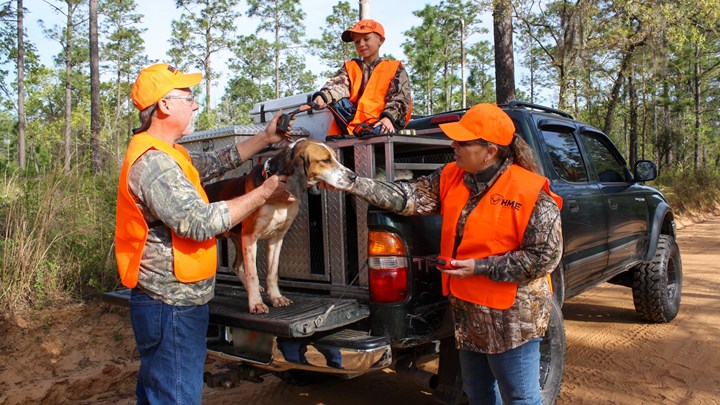
by Mark Chesnut - Tuesday, June 10, 2025

The battle to save the age-old tradition of hunting with hounds in Arizona continues to be a contentious one, with sportsmen and scientific wildlife management recently winning another battle in the ongoing war on hound hunting.
First, some background. The Center for Biological Diversity filed a petition earlier this year with the Arizona Game and Fish Department (AZGFD) Commission to prohibit the use of dogs while hunting mountain lions, black bears and other wildlife. The petition was a follow-up effort after the same anti-hunting organizations failed to get mountain lion hunting outlawed through a 2024 Colorado ballot initiative.
“In most cases, hound hunters allow their dog packs to run far beyond their direct control, with the hunter using GPS collars connected to a network of satellites to follow their dogs remotely with the aid of a smartphone or other handheld smart device to pursue and ‘take’ wildlife,” the petition stated. “Such practices are inconsistent with the integrity of fair chase hunting, and with the acknowledged purpose of regulations limiting the use of electronic devices to locate wildlife for the purpose of taking or aiding in the ‘take’ of wildlife.” The petition also argued, “In their pursuit, the dogs can encounter nontarget wildlife, leading to the harassment, injury and death of wildlife, including rare and sensitive species such as jaguars, ocelots and wolves.”
The AZGFD Commission considered the petition on April 11 at a meeting attended by far more anti-hunters than those supporting hunting with hounds. However, a report to the commission
prepared by four AZGFD biologists proved to be convincing enough that the commission denied the petition, leaving hound hunting legal—at least for now.
As the report pointed out, those wanting to ban hunting with hounds based their opinion mainly on emotion, not science.
“Most of the petitions’ language objects to the hunting of mammals with dogs based on normative value judgments and opinions of ‘unsporting and unethical’ activities,” the report stated. “All opinions and disagreements are valuable, but not all can be resolved with data and science. Allegations raised in the petitions that hunting with dogs disrupts ecosystem balance, represents a public safety hazard, represents a risk to nontarget and protected wildlife, and violates Arizona’s laws and regulations are unfounded and not supported by information in the petitions or anywhere we could find in the scientific literature.”
The report also stated that the AZGFD continues to value and maintain abundant and widespread populations of all native species in the state, including large carnivores. Additionally, the agency’s management plan for black bears and mountain lions is quite fluid, always being tweaked to ensure populations of both species are maintained and managed.
“Our management of black bears and mountain lions, specifically, continues to change as new information becomes available from our own research and management experience or that of others in North America,” the study stated. “As a result of our adaptive management paradigm, Arizonans enjoy a diversity of abundant large mammals.”
Additionally, the authors of the study pointed out that hunters using dogs are able to be more selective about the mountain lions they harvest, which is a plus for managing the species.
“Using hunting dogs can increase selectivity of harvest and can be an effective way to meet population management objectives while shifting the harvest away from females and immature animals,” the study stated. “Hunters without dogs typically harvest mountain lions at longer distances, are less likely to be able to determine the sex or size, and are more likely to harvest the first mountain lion they see.
“Whether managing at the population level, pursuing an individual animal for public safety reasons, conducting research or simply taking part in the sustainable use of a renewable natural resource, selectivity is an important advantage of using dogs to accomplish what is not possible without them.”
Ultimately, the report advised the commission to not grant the petitioners’ wish to ban hunting large mammals with hounds in the state.
“Arizona’s wildlife are managed for the inclusive enjoyment of all citizens,” the study concluded. “Beyond the value in wildlife management and research, hunting with dogs represents the sustainable use of a renewable natural resource and provides wholesome meals for the public without further taxing natural resources or commercial meat production. All these are valid reasons for maintaining and managing the sustainable harvest of native wildlife species with the aid of dogs.”
Of course, anti-hunters’ disdain for hunting with hounds won’t go away anytime soon, and there’s little doubt that more petitions and/or lawsuits seeking to ban hunting with hounds in the Grand Canyon State will follow. Hopefully, the AZGFD Commission and state wildlife agencies nationwide will continue in the future to prioritize science-based wildlife management over feel-good management tactics based on emotion.
About the Author
Freelance writer and editor Mark Chesnut is the owner/editorial director at Red Setter Communications LLC in Jenks, Okla. An avid hunter, shooter and field-trialer, he has been covering Second Amendment issues and politics on a near-daily basis for over 25 years.
E-mail your comments/questions about this site to:
[email protected]
Proudly supported by The NRA Foundation and Friends of NRA fundraising.
